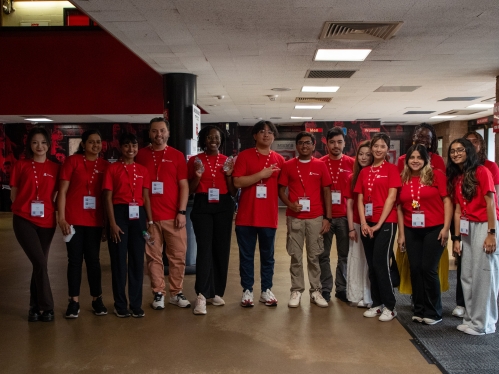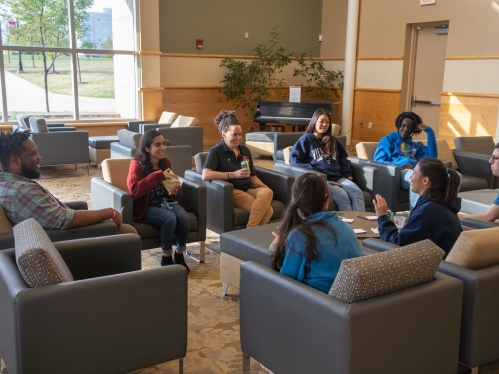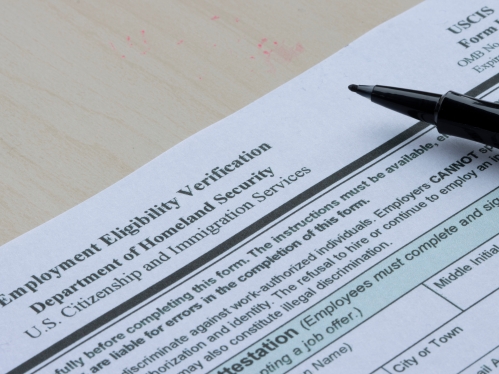
Employment
Interested in finding a work or internship opportunity during or following your studies? Learn more about eligibility and application procedures to ensure you have the necessary work authorization before starting any employment.
On-Campus Employment
F-1 and J-1 international students sponsored by Rutgers have permission to work on-campus while pursuing their studies and maintaining their legal status. However, international students working on the New Brunswick campus must obtain an International Payroll Form from Rutgers Global–International Student and Scholar Services (ISSS) to give to their on-campus employer before beginning work. On-campus employment is limited to 20 hours per week when school is in session but may be unlimited during official vacation periods. Vacation periods are defined by the official Academic Calendar.

Accordion Content
-
- Graduate and teaching assistantships
- Fellowships
- Employment with a department, office, or unit at Rutgers
- Employment with an outside company located on campus that provides direct services to students (such as a fast food establishment or bookstore)
If you are unsure if a position qualifies as on-campus employment, please consult with an international student adviser Rutgers Global–International Student and Scholar Services before accepting employment.
-
1. If you have not already done so, complete the the online Check-In e-forms and Staying in Legal Status workshop on the RGlobal Portal (under Workshops in the left-hand menu).
2. Complete the online On-Campus Employment Workshop via the RGlobal portal (under Workshops in the left-hand menu).
- You will need to complete this workshop before moving on to step 2 and 3 below.
3. Submit your online request for the International Payroll Form (via RGlobal portal)
- This is to give to your on-campus employer to support them in adding you to the Rutgers payroll system.
4. If you need a Social Security Number, first complete the On-Campus Employment Verification Letter with your on-campus employer. This letter must include an original, PEN ink wet signature from your employer. This means bring the original document that was signed - not a scanned copy or digital signature. Then submit your online request for the Social Security Letter (via RGlobal portal).
- You will use both of these forms at the Social Security Administration.
5. Once you have a social security number, be sure to provide it to your on-campus employer. This is needed for your on-campus employment tax and W-9 purposes. You can update it here.
Important: Authorization for on-campus employment for F-1 students is automatically terminated once a student completes his or her degree requirements.
-
1. If you have not already done so, complete the online Check-In e-forms and Staying in Legal Status workshop on the RGlobal Portal (under Workshops in the left-hand menu).
2. Complete the online On-Campus Employment Workshop via the RGlobal portal (under Workshops in the left-hand menu).
- You will need to complete this workshop before moving on to step 2 and 3 below.
3. J-1 students must report all on-campus employment to ISSS so we can update your SEVIS record with each employment opportunity. Complete the Employment Verification Form for J-1 Students with your on-campus employer. This form must include an original, PEN ink wet signature from your employer. This means bring the original document that was signed - not a scanned copy or digital signature. Then submit it in the International Payroll Form request (via RGlobal portal)
NOTE - if you are a sponsored student, such as Fulbright, you must also submit a letter from your sponsor stating that you are approved to work on-campus.
4. If you need a Social Security Number submit your online request for the Social Security Letter (via RGlobal portal).
- You will use both of these forms at the Social Security Administration.
5. Once you have a social security number, be sure to provide it to your on-campus employer. This is needed for your on-campus employment tax and W-9 purposes. You can update it here.
Important: On-campus employment for J-1 students is only authorized during the time stated on the Employment Verification Form for J-1 Students. J-1 students must submit an updated Employment Verification Form for J-1 Students online through the RGlobal portal every time they change, add or extend a job on campus. You must submit an International Payroll Form Request each time you have new employment on campus.
-
Rutgers Employment Opportunities (jobs.rutgers.edu)
Please note: The following resources are not available to Rutgers Health students.
On-Campus Jobs Tips Sheet (Career Exploration and Success)
Practical Training for F-1 Students
Practical Training is authorization for temporary employment that allows F-1 students to work off-campus for the purpose of gaining experience or additional knowledge in their fields of study. Practical Training includes Curricular Practical Training (CPT), Optional Practical Training (OPT), and STEM OPT Extension.

Academic Training for J-1 Students
Academic Training (AT) is optional, additional training experience for J-1 students. AT must be directly related to the student's field of study and authorized by the program sponsor on your DS-2019 and in writing BEFORE a student begins employment. The academic training program needs to be evaluated for effectiveness in achieving its goals and objectives. AT is authorized for a specific job; it is not a blanket work permission in one's field of study. AT can be authorized as pre-completion or post-completion, or a combination of the two.

Accordion Content
-
Work must be primarily in-person. J-1s on Academic Training may work remotely no more than 40% of the time (e.g., two days out of five)
- Pre-completion Academic Training: training that begins and ends during your enrolled coursework/studies.
- Post-completion Academic Training: training that continues on or begins after your completion of coursework/studies and requires an extension of the DS-2019. As a result, financial support and health insurance must be verified before extended. Post-completion Academic Training applications are due before completion of coursework/studies and before your current DS-2019 expires.
The criteria and procedure outlined here are specific to J-1 students sponsored by Rutgers. Students sponsored by another J-1 exchange visitor program (i.e. IIE/Fulbright, VEF, etc.) should contact their sponsoring agency for additional information.
J-1 students interested in acquiring AT authorization should review the information below and then contact Carissa McCarthy for an appointment to discuss the application.
For job search tips and resources, please visit University Career Services International Student Resources.
Students that do not have a Social Security Number (SSN) will need to apply AFTER they receive the AT authorization and new DS-2019 from Rutgers Global-ISSS.
All J-1 students, even while on Academic Training, are required to report any serious incidents or problems encountered during their time in the United States to Rutgers Global –ISSS, in accordance with the Department of State’s guidelines. The examples provided in these guidelines are not meant to be exhaustive (i.e., there may be other serious situations, not listed, that have or could endanger the health, safety, or welfare of an exchange visitor or otherwise could be expected to bring the Department of State, the Exchange Visitor Program, or the sponsor's exchange visitor program into notoriety or disrepute).
-
J-1 students eligible for AT are:
- Primarily in the United States to study rather than engage in academic training
- In good academic standing and inside the U.S. upon arrival
- Maintaining legal status
- Offered a paid or unpaid position related to their field of study before the expiration of the student’s DS-2019
- Able to show proof of insurance and sufficient funding for the duration of the AT period requested
NOTE: J-1 students who are considering to apply (or have applied) for the waiver of INA 212(e), please be aware that once the Waiver Review Division has approved your waiver request, the ISSS office is unable to extend your program beyond the current end date on your DS-2019.
-
J-1 degree-seeking students may be authorized for AT for up to 18 months, or an amount of time equal to length of the program, whichever is less. Students pursuing post-doctoral research, may be authorized for an additional 18 months (total 36 months) of AT.
The maximum length of time a J-1 non-degree student can be approved for AT is equal to the time already spent in their J-1 program. J-1 non-degree students are limited to a total stay of 24 months (inclusive of all study and AT time).
Part-time or full-time academic training is permitted during or following the completion of the J-1 student’s program. All academic training is counted as full time, even if employment is on a part-time basis.
J-1 students in STEM fields please see HERE.
The U.S. Department of State (Department) has extended the Academic Training STEM Extension until June 30, 2026, which allows undergraduate and master level students in STEM fields to be eligible for up 36 months of academic training.
- This would give "undergraduate and pre-doctoral degree-seeking students" in STEM fields eligibility for up to 36 months of academic training, which is the same amount that J-1 PhD students currently have in any field.
- Students eligible for this special STEM academic training extension are eligible only for "up to" 36 months of authorization or the period of the full course of study in the United States, whichever is less.
- Non-degree seeking students are not eligible to apply for this special STEM academic training extension
-
- Review this website, confirm you understand the Eligibility Requirements, and contact Carissa McCarthy at carissam@global.rutgers.edu for an appointment.
- Obtain an official job offer letter from your prospective employer including:
- Name and address of employer on letterhead
- Start and end dates of the training/employment, including the hours per week
- Job title, salary amount, or if the position is unpaid, and the work address (the site of activity where you will be working)
- A list or explanation of major job responsibilities and if there is any remote work, explain the remote and in-person schedule
- Signature (ink or electronic) from employer and date
- Request a complete description of your health insurance benefits and a letter from your employer indicating the date your benefits will begin. This information may be included in the letter described above. If no health benefits are provided by your employer, you are required to show proof of alternate health insurance coverage for the full period you are authorized for AT.
- Discuss your plans with your Academic Official or Graduate Program Director (or Study Abroad office in the case of exchange students) for evaluation and approval, as they will need to submit electronic approval later.
- Submit your completed application online through the RGlobal portal at least two weeks before your AT start date or degree completion date. A completed AT application includes:
- Official job offer letter
- Proof of health insurance coverage
- Proof of funding to cover living expenses, if employment is unpaid or salary insufficient to cover total expenses. If your AT salary covers your your living expenses and/or tuition, you do not need to show additional funding (unless needed for dependents. etc). To verify the amount of required living expenses, please review the Certification of Funds form.
- Name and email address of your academic official, who will respond to the request to confirm your academic training.
- A new DS-2019 will be emailed to you that includes the AT authorization information and your AT letter.
- Review this website, confirm you understand the Eligibility Requirements, and contact Carissa McCarthy at carissam@global.rutgers.edu for an appointment.
-
You must apply for AT BEFORE the expiration of your DS-2019 and the completion of degree requirements. Applications should be submitted at least two weeks before your anticipated start date.
-
AT must be granted by the program sponsor (Rutgers) in writing BEFORE the student is permitted to begin the training. AT is authorized for a specific job(s) within specific start and end dates, as indicated on an updated DS-2019. This updated DS-2019 with specifics of your AT is proof of employment authorization that you must present to your employer.
AT allows for more than one position at a time, as long as ALL positions are related to your degree and field of study. However, separate AT requests are needed for EACH and EVERY position.
-
While you are on AT, you are obliged by law to notify Rutgers Global–International Student and Scholar Services of all changes in your U.S. address, telephone number, or email address within 10 days of the change taking effect.
J-1 students are required to report any serious incidents or problems encountered during their time in the United States to Rutgers Global – International Student and Scholar Services, in accordance with the Department of State’s guidelines. The examples provided in these guidelines are not meant to be exhaustive (i.e., there may be other serious situations, not listed below, that have or could endanger the health, safety, or welfare of an exchange visitor or otherwise could be expected to bring the Department of State, the Exchange Visitor Program, or the sponsor's exchange visitor program into notoriety or disrepute).
-
In order to be eligible for a change of employer or extension of AT, your DS-2019 must be valid.
If changing employers while on post-completion AT, there CANNOT be a gap in employment dates. Post-completion AT must be continuous.
If you need to extend your authorized academic training period, you will need submit a completed AT application at least two weeks prior to the expiration of your DS-2019.
-
Leaving or Departing the U.S.
After the completion of AT, J-1 students have a grace period of 30 days within which to depart the United States.
- Log in to the RGlobal portal
- Click J-1 Student Services
- Click Close SEVIS Record
Transferring Out
Students who have been admitted to a new school (not Rutgers), can asked to have their J-1 status transferred to the new school. This requires the "release" of a student's J-1 record so they can receive new DS-2019. Please contact the ISSS office for more details and instructions at ISSS-students@global.rutgers.edu.
Changing Status
If you have changed your legal status and are (or will no longer be) a J-1 student, please follow the instructions below and submit proof of your new visa status.
- Log in to the RGlobal portal
- Click J-1 Student Services
- Click Close SEVIS Record
Accordion Content
-
The U.S. federal government and state governments have developed labor laws to protect American and international workers from unfair work practices. In general, if a person is providing any type of service or activity normally performed in exchange for money, tuition, fees, books, supplies, room, food or any other benefit, he or she is an employee protected by labor laws. Therefore, even if an international student is not paid for the work performed, he or she is still considered an employee and must have work authorization.
Generally, interns are considered employees and must receive compensation for their work. Employees may not volunteer services to for-profit private sector employers. There are very limited exceptions to this requirement, as specified the "Internship Programs Under the Fair Labor Standards Act" document from the U.S. Department of Labor.
It is important to note that New Jersey Wage and Hour Regulations are even stricter that the Fair Labor Standards Act. The New Jersey Wage and Hour Regulations (N.J.A.C. 12:56 et seq) cover this topic:
If an international student finds a unpaid internship which he or she believes does not require work authorization in compliance with the Fair Labor Standards Act, a letter from the employer specifically clarifying this matter must be provided to the student’s international student adviser before starting the position.
-
A volunteer is a person who donates his or her service for religious, charitable, civic, or humanitarian purposes to nonprofit organizations. Because volunteers give their service freely without any anticipation of compensation, they are not considered employees of the nonprofit organizations that receive their service. Therefore, international students do not need work authorization to participate in a volunteer experience.
For more information about volunteer opportunities at Rutgers and in the New Brunswick community, please see Rutgers Off-Campus Living and Community Partnerships Give Where You Live opportunities.
For more information about volunteering under the Fair Labor Standards Act, please visit this website.
Economic Hardship Employment
Students who can document severe economic hardship caused by circumstances beyond your control may be eligible for permission to work off campus.
Examples of severe economic hardship caused by unforeseen circumstances beyond the student’s control may include:
- loss of financial aid or on-campus employment without fault on the part of the student,
- substantial fluctuations in the value of currency or exchange rate,
- inordinate increases in tuition and/or living costs,
- unexpected changes in the financial condition of the student's source of support,
- medical bills, or other substantial and unexpected expenses.
In all cases, students must make an appointment to meet with an international student adviser for more information regarding the determination of eligibility and application procedures.

Accordion Content
-
If you are an F-1 student, you are eligible for severe economic hardship employment if you are:
- In F-1 status for at least one academic year
- In good academic standing
- In good legal status
- Taking a full course of study and are demonstrating that acceptance of employment will not interfere with their full course of study
- Able to demonstrate that employment is necessary to avoid severe economic hardship due to documented unforeseen circumstances beyond their control that arose after obtaining F-1 status
- Able to demonstrate that on-campus employment is unavailable or otherwise insufficient to meet the needs that have arisen as a result of the unforeseen circumstances
If authorized by USCIS, F-1 students who are eligible for economic hardship employment are limited to no more than 20 hours per week when school is in session and can be unlimited during vacation periods. Employment may be authorized in periods of up to 12 months at a time. See below for application instructions and documentation requirements.
Instructions and Requirements
How to Apply
Review this website for eligibility information and make an appointment to discuss your situation with an international student adviser.
- Be prepared to share documentation regarding your situation, such as a letter explaining the circumstance of the economic hardship and supporting materials documenting the unforeseen nature of the economic hardship.
- If appropriate, your adviser will share information regarding necessary application materials and the next steps in the application process.
- F-1 students must request a recommendation for economic hardship employment from an adviser at Rutgers Global–International Student and Scholar Services and then submit an application for work authorization to USCIS for approval.
- Applications to USCIS for economic hardship employment authorization require payment of a filing fee and take approximately three months for processing.
Proof of Employment Authorization
When approved for severe economic hardship employment, F-1 students receive an employment authorization document (EAD) card displaying the relevant validity period. Employment is authorized only after you receive your EAD card, and you may begin work on the start date listed on your card.
Authorization for economic hardship employment is automatically cancelled if you transfer from one school to another or fail to maintain status.
-
J-1 students eligible for off-campus employment because of economic circumstances are:
- In good academic standing
- In good legal status
- Taking a full course of study and demonstrating that acceptance of employment will not interfere with their full course of study
- Able to demonstrate that employment is necessary because of documented serious, urgent and unforeseen economic circumstances that arose after obtaining J-1 status
If authorized by USCIS, employment is limited to no more than 20 hours per week when school is in session and can be unlimited during vacation periods. For J-1 students, the limit of no more than 20 hours per week is cumulative of all types of J-1 student employment (on and off campus). Employment may be authorized in periods of up to 12 months at a time.
See below for application instructions and documentation requirements.
Instructions and Requirements
How to Apply
Review this website for eligibility information and make an appointment to discuss your situation with an international student adviser.
- Be prepared to share documentation regarding your situation, such as a letter explaining the circumstance of the economic hardship and supporting materials documenting the unforeseen nature of the economic hardship.
- If appropriate, the adviser will share information regarding necessary application materials and the next steps in the application process.
- J-1 students may be authorized for off-campus employment directly by a Rutgers Global–International Student and Scholar Services adviser.
Proof of Employment Authorization
When approved for off-campus employment because of economic circumstances, a J-1 student receives a written letter documenting the specific employment and validity period. Employment is authorized only after you receive your employment authorization letter and you can start work on the date listed in your letter.
Authorization for economic hardship employment is automatically cancelled if you transfer from one school to another or fail to maintain status.
Unauthorized Employment and Work Violations
It is very important to understand that as an F-1 or J-1 student, it is your responsibility to comply with university policies and immigration regulations pertaining to your legal status. Rutgers Global- International Student and Scholar Services (ISSS) is here to provide you with information and services to ensure that you remain compliant with the U.S. government as well as the institution.

Work authorization is limited for students in F-1 and J-1 status. F-1 students may work on campus for up to 20 hours/week while school is in session, while J-1 students may work on campus for up to 20 hours/week with written authorization. Any off-campus employment, paid or unpaid, must be authorized by ISSS or the U.S. Citizenship and Immigration Services (USCIS) before starting the job. To prevent any unauthorized employment and violations, talk to ISSS before you begin working.
If you discovered that you might have worked without proper authorization, please make an appointment with an international student advisor to determine if you have done something that may have violated your immigration status.
Accordion Content
-
- Working over 20 hours/week on campus while school is in session
- Working off campus without Curricular Practical Training (CPT), Optional Practical Training (OPT), or Academic Training
- Begin working before CPT, OPT, or Academic Training authorization
- Working beyond time authorized on CPT, OPT, or Academic Training
-
- Termination of legal status, for which you will need to apply for reinstatement in the U.S. or return to your home country to obtain another U.S. visa
- Accumulating unlawful presence in the U.S., which can result in arrest, deportation, or barred from entering the U.S. in the future
- Denial of further employment or practical training from ISSS or USCIS
- Possibly denial of future USCIS application (change of status to H-1B, Permanent Resident, etc.)

